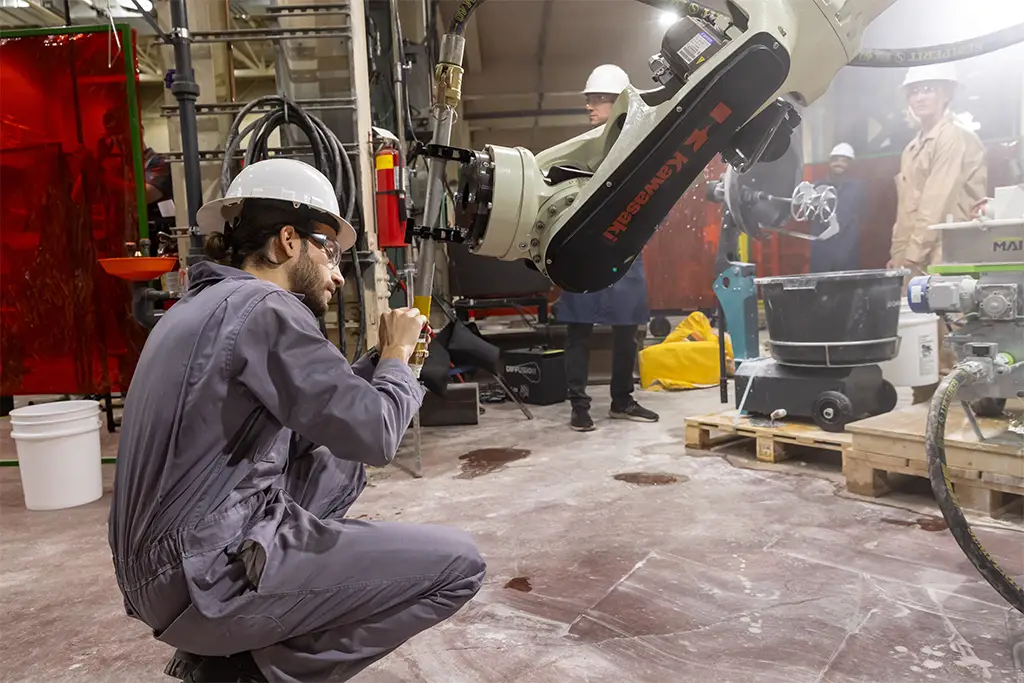
What Does a Civil Engineer Do? A Day in the Life
Delve into the daily tasks of a civil engineer.
This guide explains their roles, work environments and the skills needed to thrive in the field of civil engineering.
Request Information
Civil engineering has been part of our survival since the earliest days of human existence. Picture the ancient ancestors seeking refuge in the shelter of caves, a primitive yet ingenious form of protection. As these resourceful beings used a strategically placed tree trunk to bridge the gap over a river, the rudimentary act of civil engineering became a testament to our innate need for innovation and problem-solving.
Throughout history, from the construction of the pyramids to the development of aqueducts, civil engineering has been the silent force shaping the world around us. Today, the question echoes, “What does a civil engineer do?” especially in our modern age of skyscrapers, bridges and intricate infrastructure. Let’s delve into civil engineering to uncover the skills, knowledge, and creativity that define a civil engineer’s daily tasks.
What is a Civil Engineer?
As the name implies, a civil engineer constitutes a professional working in a branch of engineering that employs a systematic and scientific approach to planning, design, construction, operation, performance assessment, and maintenance of infrastructure. The civil engineering field encompasses the entire life cycle of structures, encompassing their conception, building and ongoing maintenance.
Licensed and specially trained civil engineers play a crucial role in developing essential infrastructure such as roadways, bridges, water and wastewater treatment plants, airports, dams, pipelines, building and waste management systems—both in public and private domains. Their expertise extends to crafting and implementing solutions that enhance community safety, efficiency and overall quality of life. Essentially, a civil engineer’s objective is to drive societal advancement through carefully planned and safe infrastructure projects, which serve as lasting symbols of positive impact.
What does a Civil Engineer do?

Civil engineers engage in a diverse array of responsibilities that collectively contribute to developing and maintaining essential infrastructure. Their tasks often encompass designing new public or private civil engineering projects, ensuring that these structures meet safety, efficiency and environmental standards. Analyzing data and preparing detailed reports, maps and budgets are other integral aspects of their work, providing the groundwork for informed decision-making.
Civil engineers navigate the bureaucratic landscape by organizing permit applications and engaging in crucial discussions with government officials and project managers to discuss planning strategies. Additionally, they play a vital role in the sustainable evolution of existing infrastructure by developing comprehensive plans for repairs or replacements.
In a field marked by constant evolution, civil engineers also dedicate themselves to staying abreast of changing zoning laws and regulations, ensuring that their projects align with the most current standards. While the specific duties may vary based on the company or project, these core responsibilities encompass the multidimensional role of civil engineers in shaping our communities’ physical and functional landscapes.
What is the workplace of a Civil Engineer like?
Civil engineers can operate in various work environments that span diverse locations and conditions. Their workplaces include both indoor office settings and outdoor construction sites, where they oversee and manage multiple projects. Office work includes design of infractures including bridges, buildings, roadways, airports, water and wastewater treatment plants, etc. They work individually and as a team with people from different backgrounds and expertise including architects, geologists, electrical, and mechanical engineers.
The Bureau of Labor Statistics (BLS) reveals that the largest employers of civil engineers are within engineering services, constituting 48% of the workforce. Additionally, civil engineers find significant employment in state and local governments, nonresidential building construction and federal government agencies, contributing 12%, 10%, 6% and 3%, respectively.
In construction, some civil engineers may establish temporary offices, often in trailers, to efficiently manage projects directly on site. This versatility in work settings highlights the adaptability required in the field, allowing civil engineers to easily navigate between the planning, design and construction phases.
Essential Skills for Civil Engineers
To accomplish their daily tasks, civil engineers must draw upon a combination of both hard and soft skills. Fusing these skills helps with individual success by contributing to the overall efficacy and smooth execution of complex engineering projects.
Technical Skills
In terms of hard or technical skills, civil engineers need to possess:
- A strong foundation in mathematics, physics and chemistry to tackle the quantitative aspects of their projects.
- Proficiency in the planning, design, construction, operation, performance assessment, and maintenance of infrastructure in different areas of civil engineering including environmental, geotechnical, structural, transportation and water resources
- Proficiency in reading maps and blueprints.
- Computer skills in utilizing specialized software such as Microstation, Civil 3D and AutoCAD for precise modeling and drafting.
- Technical writing skills for creating comprehensive reports and documentation.
Soft Skills
On the other side, the technical skills mentioned above must be paired with:
- Effective teamwork
- Communication skills
- Critical thinking and problem-solving
- Time management skills
- Leadership qualities
How to Become a Civil Engineer
The initial step toward a career in civil engineering involves obtaining a relevant bachelor’s degree from an accredited institution. Common choices include civil engineering, construction, engineering, and civil engineering technologies, among other related fields.
After completing a bachelor’s degree in Civil Engineering, many opt for a graduate degree, such as a master’s in Civil Engineering or a Ph.D. in Civil Engineering, which can further advance one’s career, particularly those aspiring to managerial or academic roles. Additionally, obtaining relevant certifications allows individuals to enhance their qualifications in specific engineering specialties.
Many entry-level and non-supervisory roles do not require professional engineer (PE) licensure. However, the need for a PE license becomes more critical for civil engineers in roles involving public safety, where they are responsible for designing and overseeing projects impacting public health, safety and welfare.
For those interested in advancing to professional engineer roles, taking the Fundamentals of Engineering (FE) exam administered by the National Council of Examiners for Engineering and Surveying (NCEES) is essential. After passing the FE exam, individuals become engineer interns (EIs) or engineers in training (EITs). Following a few years of training, they can become licensed by passing the Principles and Practice of Engineering exam.
Salary and Job Outlook for Civil Engineers
The job outlook for civil engineers is promising, with a projected 5% growth in employment from 2022 to 2032, surpassing the average for all occupations. Approximately 21,200 job openings are anticipated each year over the decade, driven by the need to replace workers transitioning to different professions and those retiring from the labor force.
In terms of compensation, the median annual wage for civil engineers as of 2022 is $89,940. The lowest 10% earned below $61,040, while the highest 10% earned over $138,690. Salaries vary across industries, with civil engineers earning as follows:
- Federal government: $103,170
- Local government: $101,460
- State government: $87,010
- Engineering services: $86,440
- Nonresidential building construction: $78,420
Should you pursue a career as a Civil Engineer?
A career as a civil engineer is not just a job; it’s a path filled with opportunities for growth, innovation and a tangible impact on the world. While the road to becoming a civil engineer involves rigorous education and the challenge of obtaining licensure, the rewards are substantial.
Beyond the financial rewards and positive job outlook, which speak of the demand for skilled professionals in this field, the profession offers the chance to be at the forefront of transformative projects, influencing the development of infrastructure that directly impacts communities. From designing resilient and sustainable infrastructure to ensuring the efficiency of public services, civil engineers have the chance to contribute to the well-being and progress of society.
Moreover, the challenges, including the responsibility for public safety in specific roles, are intrinsic to a profession with substantial significance. These challenges provide a sense of purpose as well as opportunities for continuous learning and professional development. So, if you are drawn to solving complex problems, fostering creativity and making a lasting impact on the communities you serve, a career in civil engineering is an avenue to fulfill those aspirations. It’s a career path where challenges are met with innovation and every project becomes an opportunity to leave a positive imprint on the world.
Bottom Line
Civil engineers are the architects of our modern world, orchestrating the construction of structures that stand as testaments to human ingenuity and progress. If you’re captivated by the thought of transforming ideas into tangible realities and envision yourself at the forefront of groundbreaking projects, consider becoming a civil engineer.
Here at the University of North Dakota (UND), we offer various programs that cater to every stage of your academic pursuit, from a Bachelor of Science in Civil Engineering to advanced degrees and accelerated options combining both. Join us in sculpting a future where the bridges we build connect not just physical landscapes but also the aspirations of future generations.
FAQ's
Environmental engineers have an annual median wage of $96,530. It’s crucial to recognize that these figures provide a general overview and individual earnings may vary based on additional factors such as education, certifications and the specific demands of the job.
Civil engineering can be stressful, depending on the project’s complexity, deadlines and job role. However, good teamwork and effective management can lessen this stress. Many engineers find satisfaction in overcoming challenges and completing projects, which can offset the stress. It’s important to note that each person’s experience with stress varies and finding a balance is key in this field.